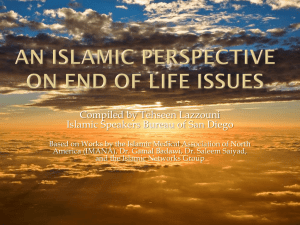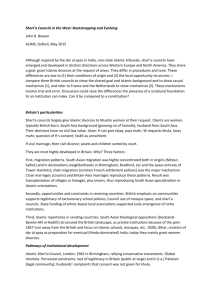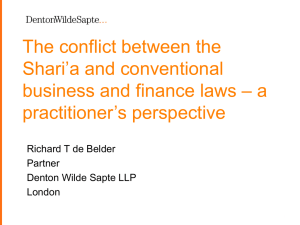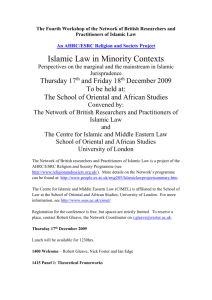Islamic Commercial Law
advertisement
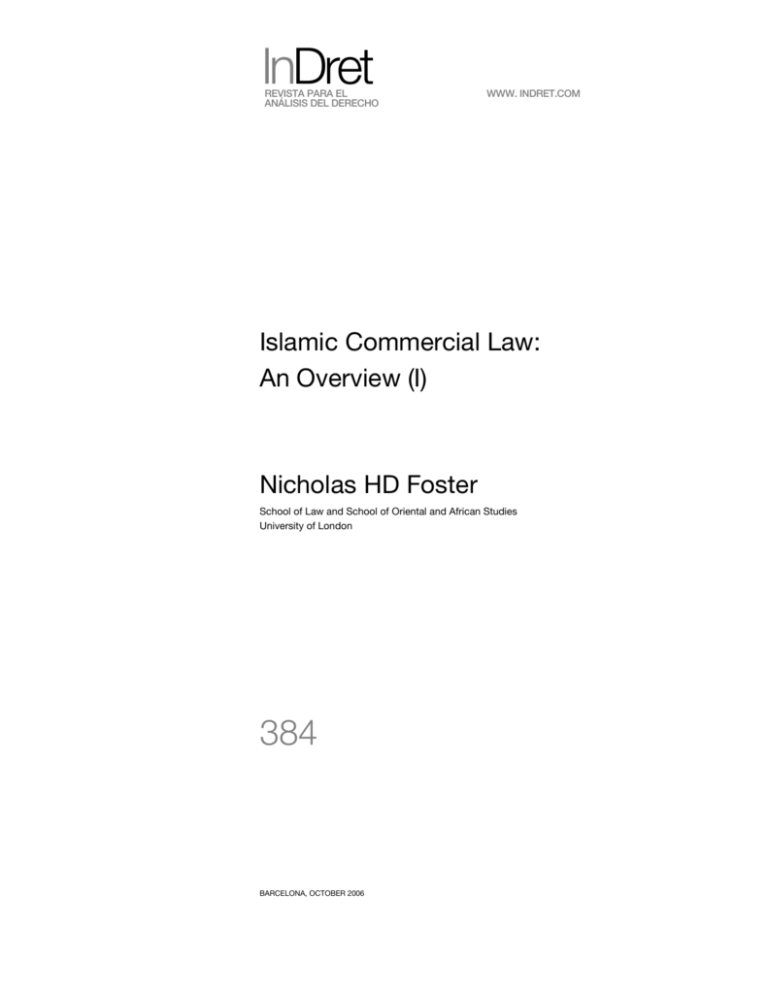
InDret REVISTA PARA EL ANÁLISIS DEL DERECHO WWW. INDRET.COM Islamic Commercial Law: An Overview (I) Nicholas HD Foster School of Law and School of Oriental and African Studies University of London 384 BARCELONA, OCTOBER 2006 InDret 4/2006 Nicholas HD Foster Abstract ‘Islamic law’ covers all aspects of human behaviour. It is much wider than the Western understanding of ‘law’, and governs ‘the Muslim’s way of life in literally every detail and, of course, it also regulates commercial transactions. It follows that the Islamic conceptual framework is quite unlike that of Christianity in which law is secular. There is no Christian law of contract, for example, no Christian law of property, whereas bodies of law dealing with such matters do exist in the shari’a –the ‘legal’ verses of the Koran and the traditions of the Prophet. The shari’a has long been abandoned and substituted by Western law. However, as a result of the Islamic revival, the possibility of adapting the shari’a to the modern world has been considered recently. Summary 1. Introduction 2. The Background 2.1 ‘Islamic Law’, Shari’a and Fiqh 2.2 Shari’a Commercial Law 2.3 The Shari’a: Development and Eclipse 2.4 The Significance of Shari’a Commercial Law Today 2.5 Shari’a Commercial Law in the Modern World 3. References 2 InDret 4/2006 Nicholas HD Foster 1. Introduction1 The numerous tragic events of the past few years, such as the terrorist attacks on the Twin Towers in New York, Bali, Madrid and London, the invasions of Afghanistan and Iraq, the ongoing violence in those two countries and the attack on Lebanon, have created an interest in Islam generally, and more particularly in the phenomenon known as the ‘Islamic revival’. One result of this new interest is an awareness of the role and importance of law in the life of Muslims. ‘Islamic law’ (in inverted commas because, as explained below, the term itself is problematic) covers all aspects of human behaviour. It is much wider than the Western understanding of ‘law’, and governs ‘the Muslim’s way of life in literally every detail, from political government to the sale of real property, from hunting to the etiquette of dining, from sexual relations to worship and prayer.’2 Notably for our purposes it also regulates commercial transactions. It follows that the Islamic conceptual framework is quite unlike that of Christianity in which law is secular.3 There is no Christian law of contract, for example, no Christian law of property, whereas bodies of law dealing with such matters do exist in the shari’a. So, although it would make no sense to refer to ‘Christian commercial law’, it is meaningful to speak of ‘Islamic Commercial Law’.4 Various issues need to be explored before we proceed to a consideration of that law. 2. The Background 2.1 ‘Islamic Law’, Shari’a and Fiqh As already indicated, the expression ‘Islamic law’ necessitates some discussion. It is telling that it is not a translation from Arabic: it cannot even be meaningfully translated into that language, which in fact uses two words, ‘shari’a’ and ‘fiqh’. In one sense of the word (and it must be said that usages vary and opinions differ), the shari’a is constituted by the ‘legal’ verses of the Koran and the Traditions of the Prophet,5 fiqh is the learned study and juristic interpretation of those sources; it is often described Transliteration of Arabic words has been simplified for ease of reading; the transliteration is not necessarily consistent. Thanks to Michael Foster Vander Elst for comments on a previous draft; the usual caveat applies. 2 HALLAQ, WB (2003). 3 With the significant exception of the Church’s jurisdiction over various matters such as divorce, which lasted to a greater or lesser degree until fairly recent times. 4 The same caveat applies here as in the text preceding footnote 2. 5 On the notion of ‘Tradition’ see below, paragraph preceding footnote 12. 1 3 InDret 4/2006 Nicholas HD Foster as ‘Islamic jurisprudence’. In a broader sense, the word shari’a also includes such interpretation.6 The concepts are normally regarded as distinct, although naturally the boundaries between them are not absolutely clear-cut. Muslim scholars rightly criticise the term ‘Islamic law’ for its failure to distinguish between the two phenomena. In this article, therefore, the term will be avoided from now on. The shari’a must be clearly differentiated from the state law of Muslim-majority jurisdictions. Some jurisdictions do have a provision in their constitution that the shari’a is a or the principal source of law,7 and some have enacted statutes based on the shari’a. However, this is different from the shari’a being the law. In the first case, it is no more than a/the source; in the second, one of its essential attributes, its ultimate authority, has been altered, from Allah to the state. The one exception is Saudi Arabia, where the shari’a is the law, but even there it is supplemented by numerous ‘regulations’ enacted by the government. 2.2 Shari’a Commercial Law ‘Commercial law’ is an imprecise term. In comparisons as between Western systems, the primary linguistic difference is that the common law term tends to cover transactions rather than institutions such as partnerships and companies, whereas civilian law equivalents encompass both. Another striking difference, which cannot be categorised according to the common law/civilian law divide, is that between systems which have a formal distinction between commercial and non-commercial law and those which do not.8 The considerations do not apply to the shari’a. The distinction between transactions and institutions is not relevant because, although the shari’a does have contracts which resemble our partnerships, it has practically no concept of legal personality.9 As regards the distinction between commercial and non-commercial law, the jurists did, naturally, categorise the shari’a, but the principal divisions were akhlaq (morals), ibada (religious observance) and mu’amalat (transactions) and, although they did 6 The literal meaning of ‘shari’a’ is the path, or road, to water; ie it is the path which directs you the right way as regards your faith in God. See also: ‘The word ‘fikih’, sometimes used interchangeably with ‘şeriat’, refers to the science of exploring the rules of the şeriat. Fikih signifies the human aspect of those rules, whereas şeriat signifies their divine aspect.’ BEDIR, M (2004). 7 See, eg, Art 2 Egyptian Constitution 1971 as amended in 1980 (the main source); Art 2 Kuwaiti Constitution 1962 (a main source). 8 Italy, for example, does not have a formal distinction. United States jurisdictions do not fit into this categorisation, as they have statutes based on the Uniform Commercial Code, but do not make a formal distinction in the same way as, say, French law. 9 There were a few instances of phenomena which were similar to legal entity ideas, but they were not developed or used to any significant extent. 4 InDret 4/2006 Nicholas HD Foster recognise the difference between commercial and non-commercial transactions to some extent,10 this acknowledgement did not have anything like the same nature or significance as the Western divide.11 In the shari’a, the same principles of morality apply to all situations; one should not behave in one way at home and another way in the office. The shari’a attitude has deep roots, for it reflects the Prophet’s many years of experience as a trader before his prophetic mission. This uniformity of treatment is a particularly important aspect of the subject because it gives rise to some major differences between the shari’a and Western commercial law regimes. The latter, whether or not they contain a formal distinction, work on the assumption that different attitudes are needed for commercial as opposed to non-commercial transactions, since business people need less protection than ordinary individuals and different moral standards apply. Accordingly, any definition of ‘Shari’a commercial law’ (one might be: ‘all those parts of the shari’a relating to the exchange of goods and services with the aim of profit’), must be read in the light of the considerations outlined above. 2.3 The Shari’a: Development and Eclipse But what is the shari’a? The question is perhaps best answered by a brief historical overview. The Prophet Muhammad received his first divine message in approximately 610 AD, having up to that date been a highly respected merchant and arbitrator. The message was followed by other revelations, which were gathered together after his death in the collection now known as the Koran, literally ‘reader’, from the root ‘qr’’, to read. The Koran contains a considerable number of verses with legal significance, but is far from being a comprehensive code. It is supplemented by accounts of the Prophet’s words and deeds, his practice or ‘sunna’, recorded in short narratives called ‘hadith’, the English translation of which is ‘Tradition’. Even this combination, though, does not provide enough detail to deal with all commonly occurring problems, so the jurists devised rules to fill the gaps using various techniques, notably qiyas (analogy) and ijma’ (consensus; at first that of the whole community, then that of the jurists). Various other concepts were of relevance, of these ‘urf (custom) was of great significance in commercial transactions. One concept in particular, ‘ijtihad’, should be mentioned here. Literally ‘effort’, in a legal sense it can be defined as ‘independent judgment in a legal or theological question, based on the interpretation and application of the 4 [sources of the shari’a], as opposed to taqlid [following established rules and HASSAN, H (2002). On the introduction of the Western distinction, see below, text accompanying and following footnote 22 and text following footnote 41. 10 11 5 InDret 4/2006 Nicholas HD Foster doctrine]’.12 In other words, it is a human activity which interprets the will of Allah as manifested in the Koran and the Sunna by the use of established juristic techniques. That activity can only be properly undertaken by someone with a deep knowledge of the shari’a, someone who is ‘mujtahid’. It is also used to denote creativity in the shari’a, as in the (now somewhat discredited) idea of the ‘closing of the gate of ijtihad’, and more especially in recent time, the adaptation of the shari’a to modern conditions.13 The law which emerged was ‘the law of the body politic’,14 but it was to a significant extent devised, and almost entirely managed and interpreted, by jurists working within madhahib (singular madhhab, rendered in English as ‘school’). The madhahib were very largely independent from the ruler who was, in principle and usually in practice, subject to the law, not its generator or controller. ‘Never could the Islamic ruling elite, the body politic, determine what the law was.’15 Indeed, the body politic was regarded as corrupt. ‘If Islamic law had represented to Muslims the best of religion and religious life, then the state stood for the worst of worldly temptation [and] corruption’.16 Naturally, interaction and accommodation did occur between the jurists and the ruler, but nonetheless the independent and dominant position of the shari’a do constitute a major difference between it and the modern Western idea of law. On the commercial side, the Muslim conquests created a vast area in which and out of which a great deal of trading activity took place. It was crossed by important trade routes and, for most of the very long period of classical Islam, there was a favourable economic environment. ‘Industry was developed, manpower consisted of free workers, many goods were produced for export and large quantities of coins were in circulation.’17 Gold from the Western Sudan came into the Muslim world, and circulated freely and there was: ‘intense [banking] activity’, in which bankers: ‘performed all banking operations: the exchange of money, loans, and the sale of assignments of credit’.18 As a consequence, the jurists developed a system which, it seems, (although, as we shall see, the issue is disputed)19 served the needs of participants well. However, the Muslim world was eventually overtaken by the West in areas such as technology, warfare and commercial techniques. This new WEHR, H and COWAN, JM (1976). On the ‘closing of the gate of ijtihad’, see HALLAQ, WB (1984). 14 HALLAQ, WB (2004B), p. 195. 15 Id, p.204. It must also be said that there was a symbiotic relationship between the ruler and the law which was ‘constantly negotiated’. Id, p. 187. On the relationship between law and politics generally, see id, Chapter 6. The Ottomans did enact secular laws, but they did not concern the core of the shari’a: see generally MARDIN, E (1955). 16 HALLAQ ‘“Muslim Rage” and Islamic Law’, p. 1719. Professor Hallaq is using the word ‘state’ in a broad sense here, as the modern concept did not exist during the classical period of the shari’a. 17 ASHTOR, E (1972), p. 558. See also LABIB, SY (1969). 18 ASHTOR, E (1972), p.561. 19 See below, text following footnote 33. 12 13 6 InDret 4/2006 Nicholas HD Foster superiority was forcefully brought home by a long series of events, including notably the conquest of Egypt by the French in 1798, the European domination of trade (symbolised for many commentators by the Treaty of Balta Liman in 1838 between the United Kingdom and the Ottoman Empire)20 and generally the political domination of the region by European powers. One of the consequences was a wish to ‘modernise’, in other words to imitate and adopt those ideas and institutions which seemed to have given Europe the advantage. The modernisation movement led to the shari’a being ‘abandoned with astonishing speed and completeness’ in all areas except family law;21 shari’a commercial law disappeared from almost the entire region, the one exception being, for a considerable period, the Arabian peninsula and, more recently, Saudi Arabia alone, and Western commercial law was adopted in its place. The full history of the adoption, involving notably the separation of commercial law from other legal topics, has yet to be written. In particular, commentators still argue about ‘why the reformers looked to Europe rather than build on pre-existing shari’a traditions’,22 but it seems that Napoleon brought with him to Egypt, by way of an unthinking assumption, the French idea of separating commercial and non-commercial law, and that special courts were set up to deal with commercial disputes.23 The influential adoption by the Ottoman Empire in 1850 of large parts of the French Commercial Code was made as part of a long and complex secularisation process in which the following factors, inter alia, seem to have played a part: 1. European dominance of trade; 2. the desire of European merchants to avoid local courts and local law; 3. the perception that an obligation to use the shari’a disadvantaged local merchants as against their European counterparts, who could use Western law, which was viewed as more efficient; 4. the practice of European traders of using the French Commercial Code as a kind of customary law to aid the resolution of their disputes; 5. a familiarity with the idea and practice of secular legislation in certain fields; FEROZ, A (2000), pp.4-5. HOURANI, A (1983), p. 350. 22 ASAD, T (2003), p. 212. See also below, text accompanying and following footnote 40. 23 GOLDBERG, J (1999). 20 21 7 InDret 4/2006 Nicholas HD Foster 6. the influence of the Ottoman elite, who stood to gain from trade with Europe, and the governmental desire to please them; and 7. a perception that commercial matters were of less religious significance than, say akhlaq (morals), a perception which may have been influenced by the Egyptian experience.24 However this may be, what is certain is that major parts of the French Commercial Code 1807 were imported as the Ottoman Commercial Code 1850. Subsequent developments in state law followed the pattern of a divide between commercial and non-commercial matters, This format was the progenitor of the basic attitude towards commercial law, and its un-Islamic separation from civil law seen in the legal systems of many other countries such as Egypt, Iraq, Libya and Kuwait. In drafting the civil codes of these countries, the approach of the noted Egyptian jurist, Dr Abd al-Razzaq alSanhuri, even in his second, more ‘Islamic revival’, phase of drafting ‘was premised on the view that Shari’ah cannot be reintroduced in its totality’. 2.4 The Significance of Shari’a Commercial Law Today At this point, the non-Muslim reader with no specialist interest in Islamic studies might wonder whether she should carry on reading. If shari’a commercial law effectively disappeared, why be concerned with it? Until recently, such a view would have been justified for nearly all jurisdictions and, indeed, few people took an interest in the subject. However, the Islamic revival has effected very significant changes. Perhaps the most striking manifestation of the new situation is the growth in Islamic finance and insurance, a growth which has recently accelerated as a result of the steady, and recently quite dramatic, rise in oil and gas prices over the last decade or so.25 The subject is also of considerable significance as a result of the islamisation of state-based law. Despite the fact that only non-commercial law is islamised, and commercial and non-commercial law are formally distinct, it is not possible to achieve a total isolation of commercial law from its environment. For example, in the UAE, which has a split system, the fundamental law is the Civil Code, which is based on the shari’a. The Commercial Code is a set of variations from, and additions On secularisation, see ASAD (2003), Chapter 7; on legal reform generally, ANDERSON, N (1976), -the Ottoman experience is dealt with at p.15- and CASTRO, F (1985). Anderson draws attention to the importance of commercial and penal law reform: ‘a fundamental change of attitude was inherent even in [the early commercial/penal law] stage of the reform movement’ (id, p.38); on Egypt generally, Brown, NJ (1995); on the first separation of commercial law in Egypt, see Goldberg (1999). 25 The last trough occurred in the late 1990s, with prices around $11 a barrel; at the time of writing (early September 2006) prices are around $68 a barrel. 24 8 InDret 4/2006 Nicholas HD Foster to, the Civil Code.26 So the Commercial Code is subject to shari’a influence. Significant provisions include Art 1 (means of filling gaps in legislation), Art 2 (interpretation), Art 3 (public policy),27 Art 200(1) (legality of contractual object) and Art 96 (certainty). In addition, the Civil Code includes bodies of rules relevant to commercial matters, but drawn from the shari’a. Examples include the general law of contract, the law of property, the law of traditional (non-bank) guarantees, the law of security over movables and the law relating to the transfer of rights. The commercial aspects of the shari’a cannot, therefore, be ignored.28 And even if the law has a Western appearance, it may be interpreted in a shari’a manner. One example can be found in the law of agency: ‘an agency made for the mutual benefit of the parties’ is often transformed in practice into a permanent form of partnership between the principal and his agent, thus explaining the local sensitivity and social stigma attached to termination of agencies. The archaic Islamic notions of dar al-Harb and dar al-Islam are resurrected when the relationship between principal and agent breaks down or is threatened: a deeply rooted hostility beyond a mere commercial dispute could then emerge. The distance between the local agent/distributor and the foreign principal/manufacturer is not merely geographical: it is a cultural gap which cannot be bridged without some knowledge and appreciation of Islamic law and the Muslim mind.29 In addition, shari’a commercial law might be relevant in the field of international legal ‘harmonisation’, for example if Muslim-majority states wish to conform to the shari’a when entering into international harmonisation conventions, or changes required by such conventions impact upon domestic law in a way which is unacceptable from the point of view of the shari’a; an example of this problem may well occur in Saudi Arabia as a result of her accession to the World Trade Organisation. The two ‘codes’ are the Civil Transactions Law of the United Arab Emirates, enacted by Federal Law No 5 of 1985, UAE Official Gazette, December 1985, as amended by Law No 1 of 1987 (in force 29 March 1986); and the Commercial Transactions Law of the United Arab Emirates, enacted by Federal Law No 18 of 1993, UAE Official Gazette 20th September 1993 (in force 20 December 1993). The company law is the Commercial Companies Law, Federal Law No 8 of 1984 of the United Arab Emirates, as amended by Federal Law No 13 of 1988 and Federal Law No 15 of 1988. Companies are governed by a Western-style company law, which also rests on the substratum provided by the Civil Code. 27 An example of the application of public policy can be found in Art 205(2), according to which a contract is void if ‘the law prohibits dealing in a thing or if it is contrary to public order or morals’. 28 Some exceptions do occur within the regimes. For example, the law of property is a (rather unhappy) mixture of shari’a and Western concepts. 29 SALEH, S (1995). 26 9 InDret 4/2006 Nicholas HD Foster The topic is also of considerable intellectual interest as an example of a non-state legal system which seems to have worked effectively and, as seen above,30 reconciled the demands of religion and morality with the needs of commerce in a way which differs from both civilian and common-law models.31 2.5 Shari’a Commercial Law in the Modern World32 However, there are some practical problems. Since the shari’a commercial system was dismantled many years ago, we cannot be entirely sure what the shari’a was, nor how it was practised. We have texts written by the jurists, but controversy surrounds the issue of the degree to which they reflect the law in action; our best source of information, the participants in the system, died many years ago; records relevant to practice are sparse for most periods, and where they do exist only a few of them have been researched.33 An example of the controversies can be seen in the differing conclusions drawn by two eminent scholars, Emile Tyan and Abraham Udovitch. Tyan concluded from a study of notarial documents that the Hanafi rules on hawala (the transfer of a right or obligation) were significantly different from the law in action.34 Udovitch, on the other hand, after studying the Cairo Geniza documents, wrote: ‘there is an almost one-to-one relationship between the importance of problems as reflected in the Geniza papers, and the amount of space and attention they receive in the law books’,35 and: ‘Hanafi commercial law, especially that portion of it dealing with institutions of commercial association, had a very close relationship to actual practice’.36 Perhaps both were right as regards the documents they studied in the context of their time and place. As Mallat observes, ‘the exact interaction between law and reality in the classical age has not been tested in any significant manner’.37 See text accompanying and following footnote 10. In this connection, see works such as GREIF, A (1989). 32 On the ‘restoration’ issue generally, see HALLAQ, WB (2004) ‘Can the Sharia Be Restored?’ in HADDAD, YY and STOWASSER, BF (eds) Islamic Law and the Challenges of Modernity AltaMira Press. 33 RAY, ND (1997), pp.47-49. 34 TYAN, E (1946), pp.31-37. Views such as this are considered by some scholars to be a means of ‘relegat[ing] Islamic law to the status of a relic of the past’ to make it seem ‘archaic, rigid, primitive, and incapable of change’, enabling colonial adminstrators ‘to rationalize their empires’ domination and imposition of new legal and other structures’: Hallaq ‘“Muslim Rage” and Islamic Law’, p.1710. 35 UDOVITCH, AL (1970), p.128. 36 Udovitch, AL (1970B), p. 290. 37 MALLAT, C (2003), p. 735. 30 31 10 InDret 4/2006 Nicholas HD Foster However, this difficulty may be less problematic than it seems. Without going into the complexities of the debate, we can probably say with some assurance that, in many places and for long periods in most areas of commerce, the law in the books mostly reflected the law in action.38 Hanna’s extensive study of court records, for example, clearly demonstrates that commercial law played a vital part in the daily professional life of merchants in the Egypt of that time.39 There is a further difficulty. The madhahib, although in accord on all fundamental principles, did disagree, and the differences between them can, in certain circumstances, have significant consequences. For example, the mechanisms called ‘hawala’ varied so much that it is better to regard them as different institutions with not much more in common than a name and their source. In other words, one can argue that there is no such thing as ‘the shari’a’, but that there are various ‘shari’as’; or looking at the situation another way, that the shari’a is far from unified in significant respects.40 This situation poses considerable difficulties, some consequences of which are discussed in the Conclusion. Unlike state-based systems, there is no authoritative body which can tell us what the shari’a is, no legislature, no equivalent to the Judicial Committee of the House of Lords in England or the Court of Cassation in France.41 Finally, there is the issue of suitability for the modern world. As already noted, the reasons for the adoption of Western law are not entirely clear.42 The justification given by the drafting committee of the Majalla (the Ottoman codification of the Hanafi school) for the enactment of the 1850 Commercial Code was that only Western law could deal with the complexities of modern commerce: ‘During this century trade relations have expanded to so wide an area and have acquired so complex a character that Turkish law cannot settle problems concerning matters such as bills of exchange or bankruptcy, and there is need for a new and special Code of Commerce to apply to these cases.’43 The notion dominated thinking until quite recently, and many lawyers still believe it. However, the implied conclusion that any attempt to adapt the shari’a was futile is prima facie somewhat surprising. It was a legal regime with many of the elements considered essential for the proper functioning of a commercial law system, ie ‘certainty, flexibility and pragmatism’.44 It seems to have been more than adequate for the circumstances of the time, and to have played a significant role in the facilitation of commerce, with a sophisticated law of sale, financial instruments, different kinds of partnership, RAY (1997), p. 45. HANNA, N (1998). 40 EL-GAMAL, MA (2003), p.111. 41 On the nascent efforts to resolve this problem in Islamic finance, see FOSTER, NHD (Forthcoming) ‘Islamic Finance Law as an Emergent Legal System’ Arab Law Quarterly. 42 See above, text accompanying and following footnote 22. 43 Cited in ONAR, S (1955), p.294. See generally LAFON, J (1997). See also NADOLSKI, DG (1977). 44 MALLAT, C (2000) , p. 94. 38 39 11 InDret 4/2006 Nicholas HD Foster pledge law, guarantee law, and so on. ‘International’ (long-distance) networks existed serviced by commercial law mechanisms, particularly those concerned with payments. Flexibility and pragmatism seem to have been at least partly provided by custom which, despite its lack of general formal status, was recognised as a de facto source. Sarakhsi, in his Book of Sale written in the 11th century AD, wrote that ‘What matters in all things is usage.’45 According to Mallat, custom was ‘decisive’, and the strict rules of the books of fiqh were abandoned ‘in favor of the merchants’ customs’,46 a position justified by two Prophetic Traditions: ‘Everything that Muslims regard as good is good in God’s eyes’ and ‘My community will not agree on an error’.47 Whatever the real reasons,48 the result of that attitude, and the adoption of Western commercial law, was that the possibility of adapting the shari’a to the modern world was not considered until very recently when, as a result of the Islamic revival, there was a call for a return to the totality of the shari’a, including its commercial aspects. The consequences of this trend are seen most notably in the context of Islamic finance but are also manifested in the positive legislation of some muslim-majority jurisdictions. 3. References ANDERSON, N (1976), Law Reform in the Muslim World, The Athena Press ASAD, T (2003), Formations of the Secular: Christianity, Islam, Modernity, Stanford University Press, p 212. ASHTOR, E (1972), ‘Banking Instruments Between the Muslim East and the Christian West’, Journal of European Economic History 1 553. BEDIR, M (2004), ‘Fikh to Law: Secularization through Curriculum’, (11) Islamic Law and Society 379, p 380. SARAKHSI (11th century) The Book of Sale, cited in Mallat ‘Commercial Law in the Middle East’, p.48. MALLAT (2000), pp.94-95. The passage from Kasani (Undated (author died 1191)) Bada’e’ al-Sana’e’, is from p.209. The various types of custom are listed in MALLAT (2000), pp.95-96. See also on this subject Arts 36, 40, 41 and 43 Majalla. 47 Cited in AL-SARAKHSI, Mabsut: Kitab Al-Buyut, vol 12, p.138, cited in turn (in Arabic and English) and translated by Libson, G (1997) ‘On the Development of Custom as a Source of Law in Islamic Law’ (4) Islamic Law and Society 132, p.146. 48 See above, text accompanying and following footnote 19. 45 46 12 InDret 4/2006 Nicholas HD Foster BROWN, NJ (1995), ‘Law and Imperialism: Egypt in Comparative Perspective’, (29) Law & Society Review 103. CASTRO, F (1985), ‘La codificazione del diritto privato negli stati arabi contemporanei’, (31) Rivista di diritto civile 387. EL-GAMAL, MA (2003), ‘“Interest” and the Paradox of Contemporary Islamic Law and Finance’, (27) Fordham International Law Journal 108, p 111. FEROZ, A (2000), ‘Ottoman Perceptions of the Capitulations 1800-1914’, (11) Journal of Islamic Studies 1, especially, pp 4-5. FOSTER, NHD (Forthcoming), ‘Islamic Finance Law as an Emergent Legal System’, Arab Law Quarterly. GOLDBERG, J (1999), ‘On the Origins of Majalis al-Tujjar in Mid-Nineteenth Century Egypt’, (6) Islamic Law and Society 193. GREIF, A (1989) ‘Reputation and Coalitions in Medieval Trade: Evidence on the Maghribi Traders’ (49) Journal of Economic History 857. HALLAQ, WB (2004), ‘Can the Sharia Be Restored?’ in HADDAD, YY/STOWASSER, BF (eds) Islamic Law and the Challenges of Modernity, AltaMira Press. HALLAQ, WB (2004), The Origins and Evolution of Islamic Law, Cambridge University Press, p 195. HALLAQ, WB (2003), ‘“Muslim Rage” and Islamic Law’, (54) Hastings Law Journal 1705, p 1707. HALLAQ, WB (1984), ‘Was the Gate of Ijtihad Closed?’, (16) International Journal of Middle East Studies 3. HANNA, N (1998), Making Big Money in 1600: The Life and Times of Isma’il Abu Taqiyya, Egyptian Merchant, Syracuse University Press. HASSAN, H (2002), ‘Contracts in Islamic Law: The Principles of Commutative Justice and Liberality’, (13) Journal of Islamic Studies 257, p 260. HOURANI, A (1983), Arabic Thought in the Liberal Age 1798-1939, Cambridge University Press, p 350. 13 InDret 4/2006 Nicholas HD Foster LABIB, SY (1969), ‘Capitalism in Medieval Islam’, (29) Journal of Economic History 79. LAFON, J (1997), ‘L’Empire ottoman et les codes occidentaux’, (26) Droits: Revue française de théorie juridique 51. LIBSON, G (1997), ‘On the Development of Custom as a Source of Law in Islamic Law’, (4) Islamic Law and Society 132, p 146. MALLAT, C (2003), ‘From Islamic to Middle Eastern Law’, (50) American Journal of Comparative Law 699, p 735. MALLAT, C (2000), ‘Commercial Law in the Middle East: Between Classical Transactions and Modern Business’, (48) American Journal of Comparative Law 81, p 94. MARDIN, E (1955), ‘Development of the Shari’a under the Ottoman Empire’ in KHADDURI M/LIEBESNY HJ (eds), Law in the Middle Eas,t Vol. 1 Origin and Development of Islamic Law The Middle East Institute. NADOLSKI, DG (1977), ‘Ottoman and Secular Civil Law’, (8) International Journal of Middle East Studies 517. ONAR, S (1955), ‘The Majalla’ in KHADDURI M/LIEBESNY H (eds), Law in the Middle East, Vol. 1, Origin and Development of Islamic Law, The Middle East Institute, p 294. RAY, ND (1997), ‘The Medieval Islamic System of Credit and Banking: Legal and Historical Considerations’, (12) Arab Law Quarterly 43. SALEH, S (1995), Commercial Agency and Distributorship in the Arab Middle East, Kluwer Law International, pp 1-1-1-2. TYAN, E (1946), ‘Cession de dette et cession de créance dans la théorie et la pratique du droit musulman (d’après le madhab hanafite)’, Annales de l’école française de droit de Beyrouth 23, pp 31-37. UDOVITCH, AL (1970), ‘The ‘Law Merchant’ of the Medieval Islamic World’ in VON GRUNEBAUM GE (ed), Logic in Classical Islamic Culture, Otto Harrassowitz, p 128. UDOVITCH, AL (1970), ‘Theory and Practice of Islamic Law: Some Evidence from the Geniza’, (32) Studia Islamica 289, p 290. 14 InDret 4/2006 Nicholas HD Foster WEHR, H/COWAN, JM (1976), A Dictionary of Modern Written Arabic, 3rd Ed. Spoken Language Services. 15

